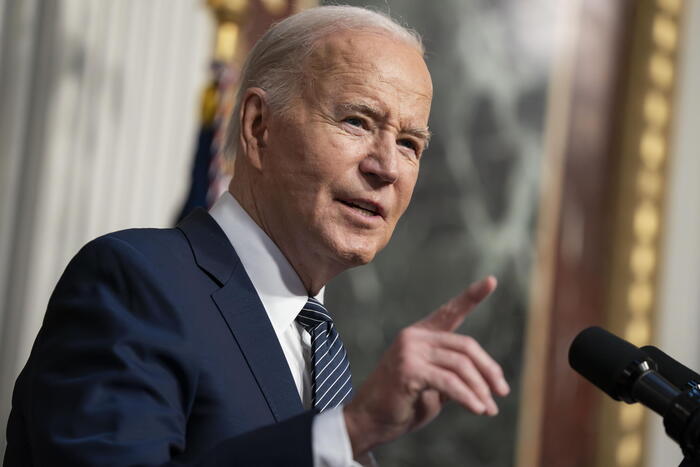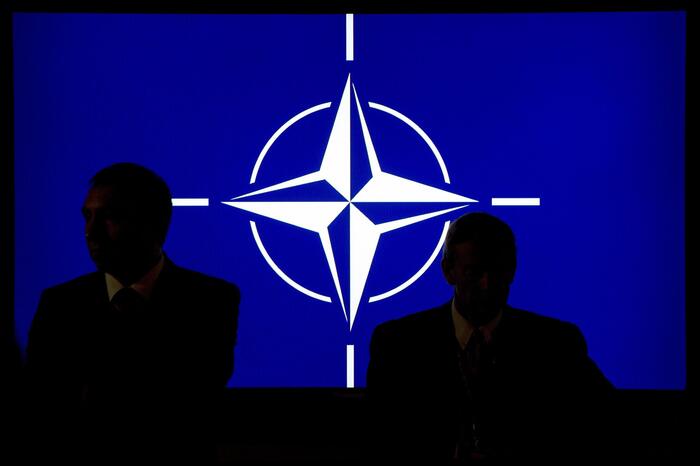Antony Blinken (right) and Jens Stoltenberg (left), this Tuesday in Brussels.YVES HERMAN / POOL / EFE
The first visit to Brussels by the US Secretary of State, Antony Blinken, has focused on Tuesday on seeking a turn by NATO towards a more decisive defense of democratic systems, eroded during the last 20 years.
Washington wants the support of Europe to stand up to an authoritarian offensive that was formerly led by the USSR and that now would obey, above all, the designs of China.
NATO's new orientation has the enthusiastic support of the United Kingdom or Canada, but causes serious reluctance in many of the European allies, including Germany and Spain.
“Sometimes we forget that [NATO] is an initiative that voluntarily groups 30 countries, with almost 1,000 million inhabitants, around the shared values of democracy, freedom, opening an international law that guarantees peaceful coexistence. ”, Has defended Blinken in his first visit as Secretary of State to the NATO headquarters in Brussels.
"We are seeing a strengthening of autocracies that poses a direct challenge to democracies," added the US secretary.
"The main challenge is to show that democracies are better able to offer people what they need and want," he concluded.
Blinken attends the NATO Foreign Ministers Meeting on Tuesday and Wednesday;
and he plans to meet with the president of the European Commission, Ursula von der Leyen, and with the vice-president of the Commission and head of European diplomacy, Josep Borrell.
Added to the presence of the Secretary of State in Brussels will be the participation of US President Joe Biden on Thursday at the European summit held by the 27 EU partners by videoconference.
The head of US diplomacy seeks the support of NATO and the European Union for a 21st century geostrategy based on the hyper-leadership and rivalry of the US and China.
During Donald Trump's time in the White House (2017-2020) that G-2 was already evident, but Europe preferred to maintain its own middle ground, given Washington's break with the current international order.
The arrival of Biden has returned the possibility of rebuilding the transatlantic relationship and even expanding it to other parts of the planet with political and legal systems similar to those of the US and the EU.
The Secretary General of NATO, Jens Stoltenberg, has assured during a televised dialogue with Blinken that "strengthening the partnership with similar democracies is a way to protect an international order based on rules."
The NATO leader has mentioned Australia, New Zealand, Japan and South Korea as countries with which to strengthen ties around a democratic axis.
Blinken has underlined during that dialogue, moderated by the director of Carnegie Europe, Rosa Balfour: “The allies of NATO add 50% of the world GDP, we have 50% of the military power, and together we can mobilize a lot of innovation and technology to deal with with the consequences and the challenges posed by the rise of China ”.
But among the European allies there is no great consensus to join this kind of new cold war, this time against Beijing and not against Moscow.
For countries like Germany, the Asian giant is a vital trading partner.
For the Baltic countries and those of Central and Eastern Europe, the main threat continues to be Russia and they prefer that NATO continue to concentrate on protecting against that neighboring country.
Spain, according to diplomatic sources, also ranks among those in favor of considering China "a more systemic than a military threat."
Even so, the risk of friction with China continues to increase.
This same Monday, the EU Council unanimously approved the first sanctions against China since those established in 1989 for the repression of the demonstrations in Tiananmen Square in Beijing.
The EU passes the first sanctions against China since the Tiananmen crisis
China and Russia exhibit a common front in the face of Western sanctions
After that tense moment, relations between the EU and China did not stop improving.
Brussels supported the entry of the Asian giant into the World Trade Organization with a status and conditions favorable to its export power.
And at the end of last year, thanks in large part to the impulse of Angela Merkel, the EU signed an investment liberalization agreement with China whose ratification may be complicated after the imposition of sanctions on Monday for the atrocities that, according to Brussels, is committing the Xi Jinping's regime against the Uighur minority in the Xinjiang region.
In the European Commission, some voices interpret that “the sanctions mark the beginning of a new era”.
And they point as proof "the speed and forcefulness" with which Beijing responded to a decision that it considers a grievance and interference in internal affairs.
The Chinese government immediately adopted its own sanctions that hit, among others, several members of the European Parliament.
But diplomatic sources from several European partners are tempering the impact of sanctions that do not question the Chinese regime but rather its concrete action in an alleged case of human rights violation.
These sources believe that "we are not facing a turning point, but rather a clarification of our relations by both parties."
The dubious withdrawal from Afghanistan on May 1
The meeting of NATO foreign ministers, with the presence of Antony Blinken for the first time, has not entirely dispelled doubts about the alliance's presence in Afghanistan, but it has made it clear that the US withdrawal on May 1 seems discarded.
"Blinken has not specified what they are going to do, but it is quite clear that between now and May 1 there is no material time to organize the logistics of a withdrawal," diplomatic sources indicated.
The Donald Trump administration had reached an agreement with the Taliban to withdraw US troops on May 1.
The exit would endanger the viability of the operation of the Atlantic Alliance (baptized as the Resolutive Support Mission as of 2015).

/cloudfront-eu-central-1.images.arcpublishing.com/prisa/VFWN4IHQROQFSTQBODOE6WHSJE.jpg)


/cloudfront-eu-central-1.images.arcpublishing.com/prisa/I7JO3SU2U37TSH2BO73YBOLNWE.jpg)




